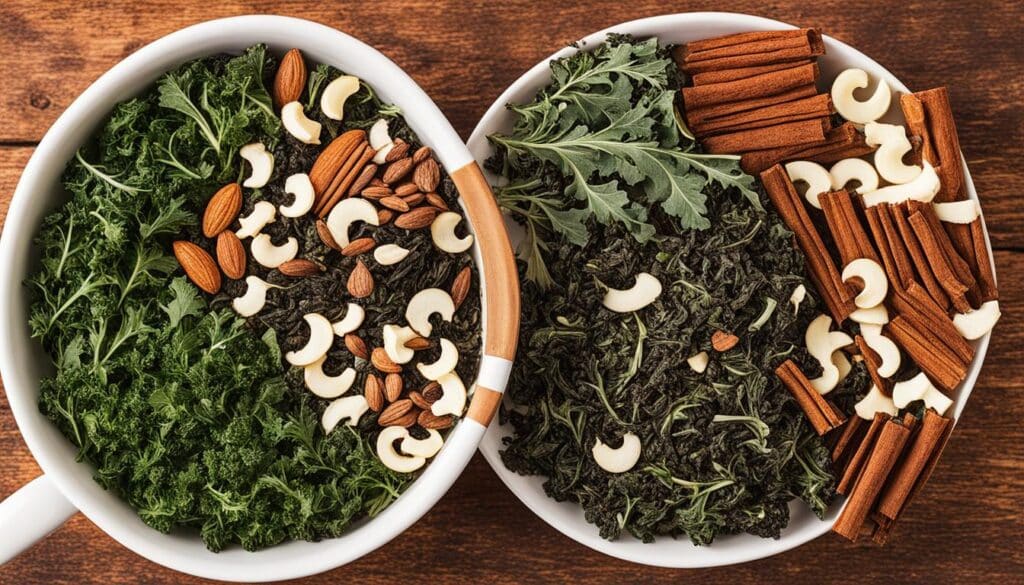Did you know over 400 million people worldwide have diabetes? Studies show that honeybush tea might help manage this condition. This tea is full of antioxidants and has no caffeine. It’s a great rooibos alternative and a South African tea you should try.
Honeybush tea, also called Heuningbos, bergtee, or mountain tea, comes from the Cyclopia plant. This plant grows in South Africa’s Western and Eastern Cape. There are about 23 types of honeybush tea. It tastes sweet and earthy, and it’s good for your health.
Key Takeaways
- Honeybush tea is a unique herbal infusion from South Africa with a naturally sweet, earthy flavor.
- It is derived from the Cyclopia plant, a shrub that grows in the Western and Eastern Cape provinces.
- Honeybush tea is gaining popularity as a caffeine-free, antioxidant-rich alternative to rooibos tea.
- Early research suggests honeybush tea may have potential benefits for managing diabetes, supporting bone health, and fighting cancer.
- Honeybush tea is rich in minerals and may also offer skin health and anti-inflammatory benefits.
Introduction to Honeybush Tea
What is Honeybush Tea?
Honeybush tea is a special tea from South Africa. It comes from the Cyclopia plant, found in the coastal and mountain areas. It tastes sweet, like honey, and has no caffeine.
There are over 20 types of Cyclopia, but only a few are used for tea. This tea is sweet and caffeine-free. It’s a great choice for those looking for a new tea flavor.
“Honeybush tea has been available internationally since the late 1990s, becoming more widely known outside of South Africa.”
The Cyclopia plant grows in South Africa’s Western and Eastern Cape. Only a few of its species are used for tea. This makes sure the tea is always top quality.
Honeybush tea is loved for its sweet taste, like honey. It’s perfect for those who want a caffeine-free tea. It’s also great for relaxing before sleep.
Nutritional Profile of Honeybush Tea
Honeybush tea is special because of its nutrients. It’s low in calories and caffeine-free. A 240-ml cup has a bit of iron, potassium, calcium, copper, zinc, magnesium, manganese, and sodium.
This tea comes from Cyclopia plants like Cyclopia intermedia and Cyclopia genistoides. These plants give honeybush tea its sweet and floral tastes.
| Mineral | Amount per 240ml |
|---|---|
| Iron (Fe) | 0.3 mg |
| Potassium (K) | 0.01 mg |
| Calcium (Ca) | 0.01 mg |
| Copper (Cu) | 0.003 mg |
| Zinc (Zn) | 0.015 mg |
| Magnesium (Mg) | 0.002 mg |
| Manganese (Mn) | 0.11 mg |
| Sodium (Na) | 1.5 mg |
Honeybush tea has bioactive compounds like polyphenols and flavones. These help it fight off free radicals and may have health benefits.
It’s a great choice for an evening drink because it’s caffeine-free. More studies are needed to prove its health claims. But, its taste is loved by tea fans.

“Honeybush tea has no negative side effects and is soothing to the central nervous system.”
Potential Health Benefits of Honeybush Tea
Antidiabetic Properties
Studies show that honeybush tea has special compounds that might help with diabetes. These compounds, like mangiferin and hesperidin, could help manage type 2 diabetes. They might make insulin work better, help fix damaged cells in the pancreas, and control sugar levels.
A study with people found that drinking honeybush tea made insulin work better. This is good news for those at risk of getting diabetes. More studies are needed, but honeybush tea could be a natural way to keep blood sugar levels in check.
| Compound | Potential Antidiabetic Effects |
|---|---|
| Mangiferin | Stimulates insulin secretion, promotes pancreatic cell regeneration, regulates enzymes involved in sugar metabolism |
| Hesperidin | Improves insulin resistance, enhances glucose uptake in cells, exhibits anti-inflammatory properties |
More research is needed, but honeybush tea might be a good addition to a diet. It could help manage type 2 diabetes and keep blood sugar levels healthy.
“The polyphenols in honeybush tea, such as mangiferin and hesperidin, have demonstrated promising antidiabetic effects in laboratory studies, indicating their potential to help manage type 2 diabetes.”
honeybush tea and Bone Health
Studies show that honeybush tea might help keep bones strong. This is thanks to its mangiferin and hesperidin antioxidants.
Lab tests found that these antioxidants in honeybush tea could help bones. They might stop bone-breaking cells and help bone-making cells. This could help prevent osteoporosis and arthritis.
Potential Cancer-Fighting Properties
The antioxidants in honeybush tea might also fight cancer. Studies in animals and labs showed that mangiferin can kill cancer cells and protect against toxins. It might also stop some cancers from growing.
We need more studies with people to be sure about honeybush tea‘s benefits. But, what we know so far looks good for bone health and cancer prevention.

“Over 10% of the American population over the age of 50 suffers from osteoporosis, and honeybush tea has properties that can prevent bone loss similar to vitamin D.”
Skin Health Benefits of Honeybush Tea
Drinking honeybush tea can help your skin in many ways. It has antioxidants that protect skin from UV damage. This can stop wrinkles and keep skin elastic.
A 12-week study showed honeybush tea helped with crow’s feet wrinkles. Animal tests also found it can lessen skin thickening and sunburn signs. Its anti-inflammatory effects may also help fight aging and protect the skin.
Honeybush is a plant from South Africa used for tea. The main types are Cyclopia intermedia, C. Subternata, C. Genistoides, and C. Maculata. Making honeybush extract involves steam, solvent, distillation, pressing, or grinding. Water or alcohol/water extraction is best.
Using honeybush or its extract can make skin or hair healthier. It can treat skin issues like dryness, acne, and aging. Cyclopia extract should be at least 50wt.-% water soluble for mixing with other products.
There aren’t many studies on honeybush’s health benefits. But, what we know shows it could be good for skin health. It may reduce aging signs and protect against UV damage.
Other Potential Benefits
Honeybush tea is known for its health benefits. But, research is finding more good things about it. It has antioxidants that might help stop fat from building up and help break down fat. This could be good for weight loss.
The tea also has isoflavones that act like estrogen in our bodies. These might ease hot flashes and mood changes during menopause. Studies show that a compound in the tea boosts immune cells. This could help our immune system work better.
People have used honeybush tea for breathing problems like coughs and thick mucus. This is because it has expectorant properties. These properties help clear out mucus so you can breathe easier.
“Honeybush tea is a remarkable beverage that continues to surprise us with its diverse health benefits. From its potential anti-obesity effects to its ability to support the immune system and respiratory function, this South African tea is a true natural wonder.” – Dr. Sarah Wilkins, Clinical Nutritionist
More research is being done on honeybush tea. As we learn more, we see how it can help our health. It’s a natural, caffeine-free choice for those looking to improve their health.
Preparation and Consumption
Honeybush tea is easy to make and enjoy at home. It comes from the Cyclopia plant, found in South Africa’s fynbos region. You can find it in loose-leaf or tea bags at some stores.
To make honeybush tea, add 1 teaspoon of loose-leaf tea to 8 ounces of boiling water. Let it steep for 5 to 10 minutes. This lets the good stuff get into the water.
The tea tastes like honey and is smooth. You can drink it alone or add milk and sweeteners like honey. But, adding these will make it more sugary. For a clean taste, drink it just as it is.
You can also make honeybush tea cold. Just steep it in cold water for a few hours. Serve it over ice for a cool drink. You can mix it with fruit juices or other teas for more flavor.
| Honeybush Tea Preparation | Honeybush Tea Consumption |
|---|---|
|
|
Honeybush tea tastes like honey and is good for you. You can drink it hot or cold, with or without extras. It’s a great way to enjoy the Cyclopia plant’s goodness.
Conclusion
Honeybush tea is a special tea from South Africa. It’s caffeine-free and full of antioxidants. This makes it a great choice for those looking for a tasty, healthy drink.
Studies show that honeybush tea might help with diabetes, bone health, fighting cancer, and skin health. It has special compounds like mangiferin and hesperidin that could be the reason.
Even though we need more studies, honeybush tea looks promising. It’s becoming popular worldwide, especially in the international market. People love its unique taste and health benefits.
In short, honeybush tea is a great choice for those who want to avoid caffeine. It’s full of antioxidants and might help with diabetes, bone health, and more. As we learn more about it, honeybush tea is set to win over health lovers everywhere.

